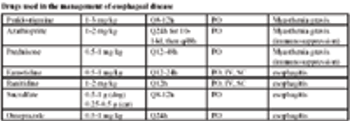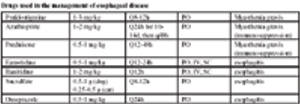
While there is no doubt that administration of immunosuppressive drugs to dogs, and sometimes cats, is critical for control of immune-mediated disease, administration of these drugs can cause adverse effects.
Dr. Rance Sellon is an associate professor in small animal medicine at the College of Veterinary Medicine at Washington State University. He received his PhD in 1995 in immunology at North Carolina State University and his DVM in 1987 at Texas A&M University.

While there is no doubt that administration of immunosuppressive drugs to dogs, and sometimes cats, is critical for control of immune-mediated disease, administration of these drugs can cause adverse effects.

Immune-mediated neutropenia is an uncommon disease in small animal practice, although some have argued that it may be more prevalent than believed.

Immune-mediated thrombocytopenia (IMTP) is one of the more common immune-mediated diseases in small animal practice, especially in dogs.

The diagnosis of immune-mediated polyarthritis can be challenging. The difficulties of establishing a definitive diagnosis of immune-mediated polyarthritis lie in generating a clinical suspicion of the diagnosis, and the absence, with few exceptions, of definitive diagnostic tests for the majority of cases that have the disease.

The immune system in many ways represents an ideal tool with which to fight cancer. It is capable of killing tumor cells, has the potential to provide long-lasting protection against recurrence, and because immune responses can be antigen- and thus tumor- specific, side effects in normal tissues may be better spared than with other conventional therapy.

The stomach plays a key initial role in digestion through its mixing actions, and through the secretion of gastric acid and pepsin, which are important for the activation of key digestive enzymes.

Gastrointestinal (GI) cytology offers many advantages to the small animal practitioner in the assessment of patients with gastrointestinal tract disease.

Esophageal diseases, including megaesophagus, can easily sneak up on the unsuspecting clinician if regurgitation, the cardinal sign of esophageal disease, is not considered a differential diagnosis for an animal that presents for what the owner perceives as vomiting.

Esophageal foreign bodies and esophagitis have the potential, if not identified and treated, to cause esophageal strictures or megaesophagus, which can be more difficult to treat.

Primary gastrointestinal (GI) neoplasia is an important differential diagnosis for a dog or cat with vomiting or diarrhea, especially chronic vomiting or diarrhea, anorexia and weight loss, particularly animals that are middle-aged and older.

The small animal clinician has a number of imaging options available for the evaluation of dogs and cats with gastrointestinal tract (GI) disease.

Inflammatory bowel disease is a somewhat loosely defined term that describes chronic gastrointestinal (GI) tract signs in dogs and cats, especially weight loss, vomiting and diarrhea.

The protein-losing enteropathies (PLE) comprise a collection of intestinal, usually small intestinal, diseases typically associated with weight loss, hypoproteinemia caused by hypoalbuminemia or panhypoproteinemia, and variable signs of weight loss, vomiting and diarrhea.

Gastrointestinal (GI) cytology offers many advantages to the small animal practitioner in the assessment of patients with gastrointestinal tract disease.

The stomach plays a key initial role in digestion through its mixing actions, and through the secretion of gastric acid and pepsin, which are important for the activation of key digestive enzymes.

While not common in terms of the frequency with which they are seen in small animal practice, primary intestinal neoplasia is an important differential diagnosis for a dog or cat with vomiting, especially chronic vomiting, chronic diarrhea, anorexia and weight loss, particularly animals that are middle-aged and older.

Primary gastric neoplasia is an important differential diagnosis for a dog or cat with vomiting, especially chronic vomiting, anorexia and weight loss, particularly animals that are middle-aged and older.

Esophageal disease can easily sneak up on the unsuspecting clinician if regurgitation, the cardinal sign of esophageal disease, is not considered a differential diagnosis for an animal that presents for what the owner perceives as vomiting.

The protein-losing enteropathies (PLE) comprise a collection of intestinal, usually small intestinal, diseases typically associated with weight loss, hypoproteinemia caused by hypoalbuminemia or panhypoproteinemia, and variable signs of vomiting and diarrhea.

Endoscopic use is increasingly utilized in small animal hospitals because endoscopic tools have great utility in the evaluation of patients with respiratory, gastrointestinal and genitourinary tract disease.

Published: August 1st 2008 | Updated:

Published: August 1st 2008 | Updated:

Published: August 1st 2008 | Updated:

Published: August 1st 2008 | Updated:

Published: August 1st 2008 | Updated:

Published: August 1st 2008 | Updated: